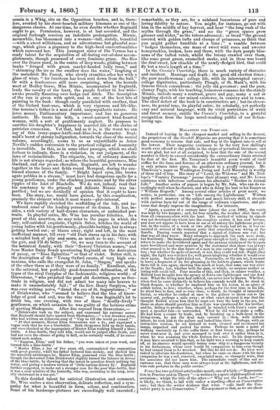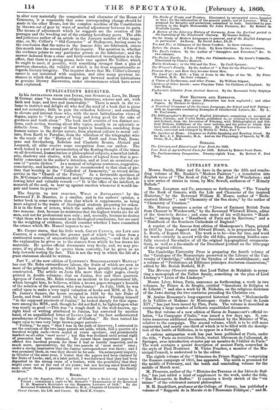MAGAZINES FOR FEBRIARY.
Instead of buying in the cheapest market and selling in the dearest, the proprietors of the Cornhill Magazine are proving that it is sometimes good economy to reverse that rule, and buy at the highest rate to sell at the lowest. Their magazine continues to be the very best shilling's worth ever offered to the public in the shape of periodical literature, and
we are glad, but not at all surprised, to hear that the sale of the second number is likely to exceed considerably the extraordinary limits attained by that of the first. Mr. Tennyson's beautiful poem would of itself suffice for the fame and fortune of an otherwise ordinary journal, but it is only primus inter pares, the goodliest in a goodly company. Mr. Thackeray's paper on Washington Irving and Lord Macaulay is worthy of them and of him. His story of "Level, the Widower" and Mr. Trol- lope's " Framley Parsonage" pursue their pleasant way, and Mr. Lewes continues with infectious enthusiasm his admirable "Studies in Animal Life." Another series of papers is begun by Mr. Sala, who can do ex- ceedingly well when he chooses, and who is doing his best in his Essays on "William Hogarth." Among several other articles of great merit, we notice, in particular, one on "Life among the Lighthouses." Written with perfect mastery of the subject and much literary skill, it abounds with curious facts far out of the range of ordinary experience, and pic- tures that deeply impress the imagination. For instance,
"Again, a quarter of a century later [about the year 1800], the watch was kept by two keepers; and, for four months, the weather shut them off from all communication with the land. The method of talking by signals was not developed anywhere into the complete system it has now become, and does not appear to have been in use at all among the lighthouse people ; but, in the course of a week or two after the storm had set in, it was ru- moured at several of the western ports that something was wrong at the Smalls. Passing vessels reported that a signal of distress was mit ; but that was all they knew. Many attempts to approach the rock were made, but fruitlessly : the boats could not get near enough to hail ; they could only return to make the bewildered agent and the anxious relatives of the keepers more bewildered and more anxious by the statement that there was always what seemed to be the dim figure of a man in one corner of the outside gal- lery; but whether he spoke or moved, or not, they could not tell. -Night after night, the light was watched for, with great misgiving whether it would ever show again. But the light failed not. Punctually, as the sun set, it seemed to leave a fragment of its fire gleaming in the lantern glasses, which burnt there till it rose again, showing this much at least, that some one was alive at the Smalls ; but, whether both the men, or which, no anxious mother or loving wife could tell. Four months of this, and then, in calmer weather, a Milford boat brought into the agency at Solve one lightkeeper and one dead man. What the living man had suffered, can never now be known. Whether, when first he came distinctly to believe his comrade would die, he stood in blank despair, or whether he implored him on his knees, in an agony of selfish terror, to live; whether, when, perhaps for the first time in his life, he stood face to face, and so very close, to death, he thought of immediate burial, or whether he rushed at once to the gallery to shout out to the nearest sail, perhaps a mile away ; at what exact moment it was that the thought flashed across him that he must not bury the body in the sea, lest those on shore should question him as Cain was questioned for his brother, and he, failing to produce him, should be branded with Cain's curse and meet a speedier fate—is unrecorded. What he did was to make a coffin. He had been a cooper by trade, and, by breaking up a bulk-head in the living-room, he got the dead man covered in ; then, with infinite labour, he took him to the gallery and lashed him there. Perhaps, with an instinctive wisdom, he set himself to work, cleaned and re-cleaned his lamps, unpacked and packed his stores. Perhaps he made a point of walking resolutely up to the coffin three or four times a day, perhaps he never went near it, and even managed to look over it rather than at it,
when he was scanning the whole horizon for a sail. In his desperation, it may have occurred to him that, as his light was a warning to keep vessels off, so its absence would speedily betray some ship to a dangerous vicinity to his forlornness, whose crew would be companions to him even though he had caused them to be wrecked. But this he did not do. No lives were
risked to alleviate his desolation, but when he came on shore with his dead companion he was a sad, reserved, emaciated man so strangely worn, that his associates did not know him. The immediate result of this sad oc- currence was, that three men were always kept at the lighthouse, and this wise rule pertains in the public service."
Fraser has two political articles this month, one of which—" Representa- tion in Practice and in Theory "—is written in a spirit of philosophical con- servatism' whilst the title of the other—" Why not the Lords, too ?"— is likely, we think, to fall with rather a startling effect on Conservative oars; but then the writer declares that what calls itself the Con- vative party is not Conservative." His argument is that, as we are about to alter very materially the composition and character of the House of Commons, it is reasonable that some corresponding change should be made in the other House, lest the complex machine of the Constitution be thrown out of gear by want of mutual adjustment between its parts. The means of adjustment .which he suggests are the creation of life peerages and the weeding out of the existing hereditary peers. The able and judicious author of an article in the January number of this maga- zine, on Mr. Collier's "Old Corrector" of Shakspeare, having come to the conclusion that the notes in the famous folio are fabricated, enters this month into the second part of the inquiry. The question is, whether the evidence points to any particular person as the fabricator; and the answer deduced from a close and fairly-conducted investigation is to the effect, that there is a strong prima facie case against Mr. Collier, which he ought to meet, if possible, with something stronger than a plea of previous character, the validity of which is far from unquestionable as regards literary integrity. The inquirer shows that Mr. Collier's literary career is not untainted with suspicion, and cites many previous in- stances in which that gentleman has put forward modern fabrications as genuine literary discoveries, under circumstances which have never been explained.



























 Previous page
Previous page